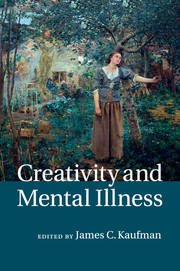Book contents
- Frontmatter
- Dedication
- Contents
- List of figures
- List of tables
- List of contributors
- Preface
- Acknowledgments
- Part I Creativity and mental illness: the state of the field
- Part II Cognitive and neuroscientific perspectives on creativity and mental illness
- Part III Creativity and the spectrum of mental illness
- Part IV Creativity and mental illness: possible commonalities
- Part V Creativity and mental health
- Part VI Creativity and mental illness: what now?
- Index
- References
Preface
Published online by Cambridge University Press: 05 August 2014
- Frontmatter
- Dedication
- Contents
- List of figures
- List of tables
- List of contributors
- Preface
- Acknowledgments
- Part I Creativity and mental illness: the state of the field
- Part II Cognitive and neuroscientific perspectives on creativity and mental illness
- Part III Creativity and the spectrum of mental illness
- Part IV Creativity and mental illness: possible commonalities
- Part V Creativity and mental health
- Part VI Creativity and mental illness: what now?
- Index
- References
Summary
Are creative people more likely to be mentally ill? This basic question has been debated for thousands of years, with the “mad genius” concept advanced by such luminaries as Aristotle (Runco and Albert, 2010). One of the first researchers to study creativity did so as a way of addressing this question (Lombroso, 1894). By the year 1800, according to Simonton (1994), this stereotype had become dogma. Most people today still accept this connection as a truth (Plucker et al., 2004).
Yet is it true? Is creativity associated with mental illness? There are many studies that argue the answer is “yes” (e.g., Andreasen, 1987; Ludwig, 1995; Post, 1994), and several prominent scholars who argue strongly for a connection (Jamison, 1993). There are also those who argue equally strongly that the core studies and scholarship underlying the mad genius myth are fundamentally flawed (Rothenberg, 1990; Schlesinger, 2009).
More recently, researchers have explored exactly what we mean by “creativity” and “mental illness” (Silvia and Kaufman, 2010). New areas of psychology have impacted the eternal debate, as scholars from positive psychology and neuroscience have addressed this key issue. There are numerous recent studies and theories that have advanced this question. Yetmost discussions of the creativity–mental illness relationship continue to cite the same decades-old work.
- Type
- Chapter
- Information
- Creativity and Mental Illness , pp. xxi - xxiiiPublisher: Cambridge University PressPrint publication year: 2014



